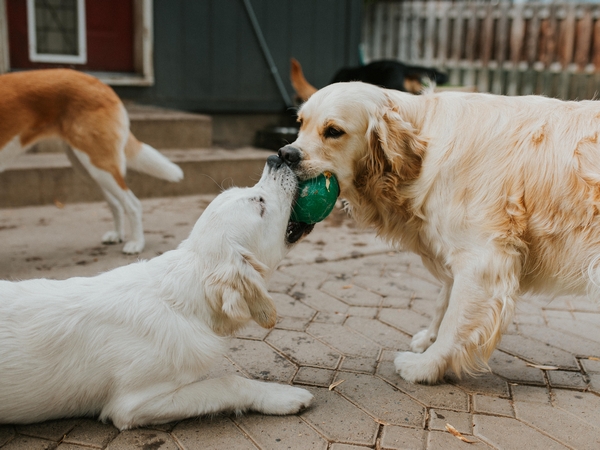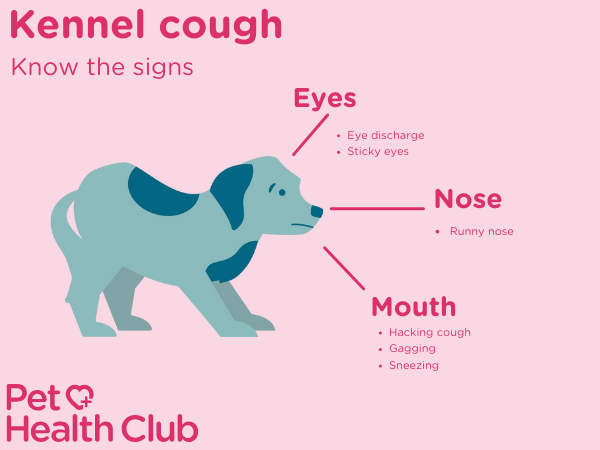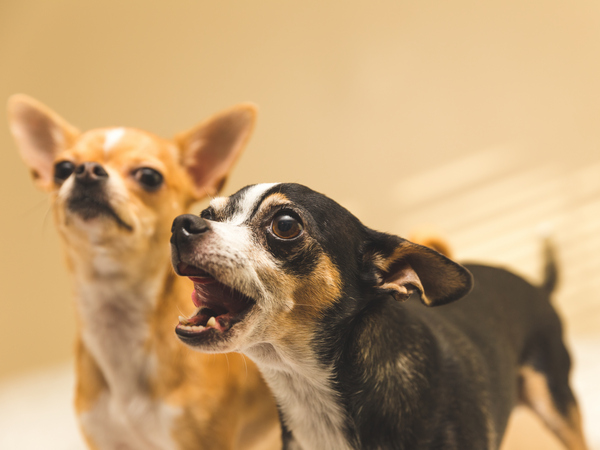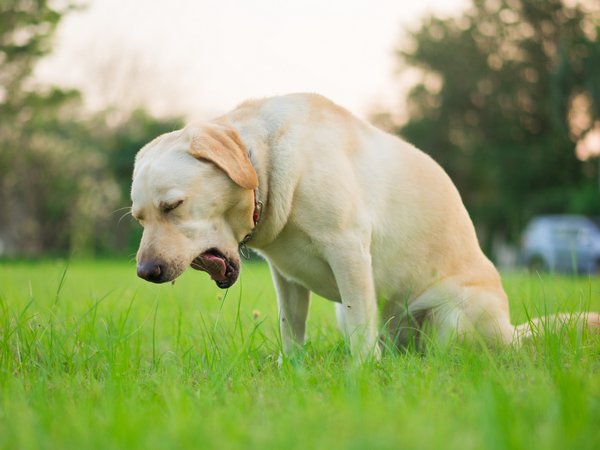How long does kennel cough last and what is it?
Kennel cough is a common illness in dogs that affects their breathing.
It’s mainly caused by bacteria called Bordetella and a virus called canine parainfluenza. This infection irritates the dog's throat and windpipe, making them cough a lot.
Most of the time, kennel cough isn’t serious and goes away in about three weeks. But it can make puppies and older dogs more likely to get other illnesses. If you're worried, talk to your vet.
Brief summary:
- Kennel cough is a highly contagious respiratory infection
- Symptoms include a dry, hacking cough
- It usually goes away on its own but may cause problems for puppies or elderly dogs
- Contact your vet if symptoms persist for more than seven days
- An annual vaccine will keep your dog protected, and is often required if you plan to leave your dog at a kennel or daycare centre
How do dogs get kennel cough?
Because it’s airborne and highly contagious, dogs are most likely to get it when surrounded by other dogs — hence the name.
But dogs don’t just catch it at kennels. The bacteria can linger for up to 48 hours on any surface an infected dog has come into contact with, such as plants, food bowls, toys and other objects.

Some things can make dogs more likely to get kennel cough. These include:
- Living in a cold or damp place
- Being around cigarette smoke
- Being around a lot of dust
- Living in a crowded or stressful place
It takes 2-14 days for a dog to show signs after getting infected. This means a dog could catch the infection and not appear sick for up to two weeks. Dogs can also carry the infection for months without showing any symptoms.
Read more: Why is my dog coughing & what should I do about it?
What does kennel cough sound like?
Dogs with this infection often make a dry, hacking sound. It can look as if they’ve got something stuck in their throat — and they may gag and swallow after coughs. They might also make a loud, goose-like honk. The coughing, which can sometimes produce mucus, often worsens after exercise or if your dog is excited. Like humans, dogs cough when trying to remove mucus from their throat.
Read more: Could your dog be reverse sneezing?
What are the main kennel cough symptoms?

The main symptoms are a hacking cough and swallowing or gagging afterwards. In rare cases, dogs may show other signs, including:
- A runny nose
- Sticky eyes
- Sneezing
- Eye discharge
Dogs with the infection usually recover quickly without treatment, but it’s always best to consult your vet to make sure it's kennel cough they're suffering from and not another condition.
Kennel cough treatment
Most dogs won’t need treatment, but there are ways you can help to speed up their response to the infection:
- Make sure they have plenty of rest
- Keep them hydrated and well nourished
- Avoid exposure to smoke, dust and household cleaners
- Soaking dry food will help to soothe the throat and reduce dust irritation
- Use a harness rather than a collar and leash to avoid putting pressure on your dog’s windpipe
- Keep their living area clean, dry and well ventilated
Keeping your dog calm, rested and away from things that may irritate their throat, will help them get better quicker.
What if my dog’s kennel cough symptoms get worse?
This illness can leave dogs vulnerable to secondary infections and, in rare cases, may lead to pneumonia — particularly in puppies or older dogs with a compromised immune system.
Contact your vet right away if you spot any of the following:
- Coughing continues for more than seven days
- Your dog loses their appetite
- They develop a fever (this usually means they become lethargic)
- They contract other symptoms or are not themselves in any way
In severe cases, your vet may prescribe antibiotics to kill the Bordetella bacteria — or cough suppressants or anti-inflammatories to help your dog shake off the symptoms if they’re bad or long-lasting.
Vet's view
by Lizzie Youens BSc(Hons) BVSc MRCVS
The Westie's cough was so forceful that its owner thought it might have something stuck in its throat, and rushed them in first thing. The patient was gagging frequently, with a harsh cough and a slightly runny nose. There was nothing stuck, but the nasty cough was likely caused by a highly infectious disease called kennel cough. The dog was regularly walked with lots of other dogs, and hadn't had the kennel cough vaccination.
Other than the cough, the patient was fairly well. She was eating, drinking and bright – in fact, spent most of the consultation jumping up and trying to lick my face! She went home with some anti-inflammatory medication to try and reduce her hoarse, productive cough and instructions to stay away from other dogs as much as possible as the disease is very contagious.
I called the owner a week later to see how she was getting on. She was still coughing, which wasn’t hugely surprising as kennel cough can last for up to three weeks, and was getting a bit bored of being walked well away from other dogs and being kept apart from her sister. In a further week, her owner called to say she was finally back to normal - and that she was going to bring both dogs in to be vaccinated soon.
How is kennel cough spread?
It’s mainly spread through airborne droplets, which carry the bacteria that cause the infection. These bacteria can come from other dogs coughing, sneezing or barking close to your pet, which is known as direct transmission. These bacteria-laden droplets are inhaled into your dog's respiratory tract and inflame the voice box (larynx) and windpipe (trachea).

It is also spread through indirect transmission. The bacteria can be found on surfaces such as food and water bowls, toys, bedding and furniture.
It's highly contagious, so it is a particular concern when diagnosed in dogs in kennels or who regularly attend doggy daycare or dog shows. You should keep your dog away from other dogs if you suspect they have the infection.
Read more: Dog vaccinations: keeping your puppy happy and healthy
How long does kennel cough last?
Most dogs will recover without treatment within one to three weeks, although it can linger for up to six weeks in more complicated cases.
How long is kennel cough contagious?
Dogs are generally contagious for around two weeks, but this can be longer or shorter depending on the severity of the infection. Again, isolation is key to stopping the spread.
Kennel cough vaccine
The most effective way to prevent your dog from catching kennel cough is to ensure they’re vaccinated against it.
Routine vaccinations do not protect against Bordetella bronchiseptica, the main cause of this infection. This additional vaccine is usually given through the nose. It doesn’t guarantee 100% protection (like human flu vaccines), but it is the best way to provide immunity.
Members of Pet Health Club™ get this vaccination as part of their subscription.
How long does kennel cough vaccine last?
The vaccine can protect puppies as young as three weeks old for up to 12 months. The best time to get your dog vaccinated against the infection is when they have their puppy vaccinations. From then, they should be revaccinated every year.
Is kennel cough vaccine effective immediately?
The nasal vaccine typically takes four days to become effective and is regarded as the fastest way to provide dogs with immunity.
Kennel cough vaccine side effects
Your dog may experience mild side effects following their vaccine. These can include:
- Coughing
- Sneezing
- Runny nose
- Watery eyes
These should only last a few days, and most dogs don't experience any side effects. You should contact your vet if they persist for more than a week.

How much does the kennel cough vaccine cost?
The cost of the vaccine tends to differ from vet to vet, but you can expect to pay up to £70. However, some preventative health care packages, such as Pet Health Club™ offer it as part of the subscription, meaning the cost of the vaccine is included in your monthly membership fee.
Read more: How pet health clubs help you save money on your pet’s health care
Can humans catch kennel cough?
Most canine viruses won’t affect humans. Bordetella bronchiseptica, the main bacteria associated with kennel cough, can infect humans — but this is incredibly rare. If you, or someone in your household, are immunosuppressed, please inform your vet if your pet needs the vaccine. They may advise checking with a human health professional in case you could be put at risk.
Can I walk my dog with kennel cough?
Because it’s so contagious, ideally, you should not walk your dog while they have kennel cough symptoms. Please be careful when and where you walk your dog if you need to. Keeping your dog on a harness and lead and walking them during quieter times of the day, like early morning or late at night, will reduce the chances of coming into contact with other dogs. Try to keep your distance if you see other walkers when you’re out.
If you decide not to walk your dog or can't give them their usual activity, consider brain games or extra training to help them get their regular dose of daily stimulation.
Taking your dog to boarding kennels?
Most boarding kennels won’t take dogs that aren’t up to date with their kennel cough vaccinations, and the vaccine can take several days to take effect, so be sure to plan if you’re going on holiday.
Need more info on kennel cough in dogs?
For more information on this infection, contact your local vet.
Find your nearest vet using our Find a Vet page, or speak to a vet online using Online Vets.


